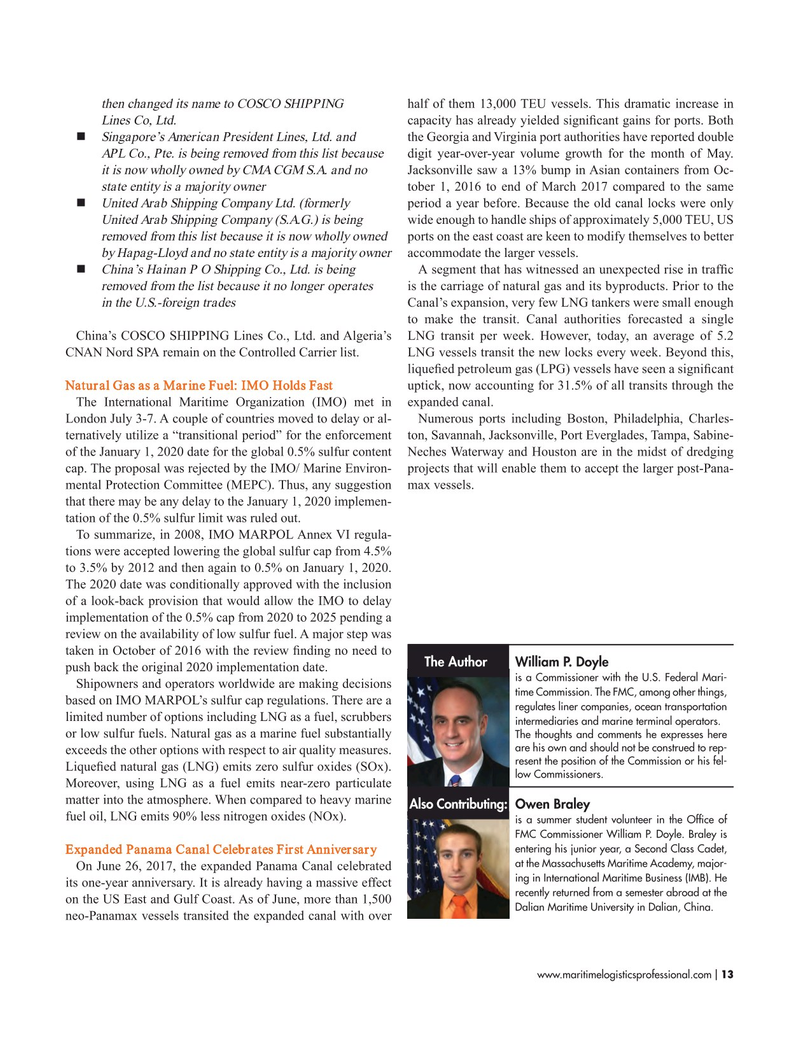
Page 13: of Maritime Logistics Professional Magazine (Jul/Aug 2017)
PORTS & INFRASTRUCTURE
Read this page in Pdf, Flash or Html5 edition of Jul/Aug 2017 Maritime Logistics Professional Magazine
then changed its name to COSCO SHIPPING half of them 13,000 TEU vessels. This dramatic increase in Lines Co, Ltd. capacity has already yielded signifcant gains for ports. Both ? Singapore’s American President Lines, Ltd. and the Georgia and Virginia port authorities have reported double APL Co., Pte. is being removed from this list because digit year-over-year volume growth for the month of May. it is now wholly owned by CMA CGM S.A. and no Jacksonville saw a 13% bump in Asian containers from Oc- state entity is a majority owner tober 1, 2016 to end of March 2017 compared to the same ? United Arab Shipping Company Ltd. (formerly period a year before. Because the old canal locks were only United Arab Shipping Company (S.A.G.) is being wide enough to handle ships of approximately 5,000 TEU, US r emoved from this list because it is now wholly owned ports on the east coast are keen to modify themselves to better by Hapag-Lloyd and no state entity is a majority owner accommodate the larger vessels. ? China’s Hainan P O Shipping Co., Ltd. is being A segment that has witnessed an unexpected rise in traffc r emoved from the list because it no longer operates is the carriage of natural gas and its byproducts. Prior to the in the U.S.-foreign trades Canal’s expansion, very few LNG tankers were small enough to make the transit. Canal authorities forecasted a single
China’s COSCO SHIPPING Lines Co., Ltd. and Algeria’s LNG transit per week. However, today, an average of 5.2
CNAN Nord SPA remain on the Controlled Carrier list. LNG vessels transit the new locks every week. Beyond this, liquefed petroleum gas (LPG) vessels have seen a signifcant
Natural Gas as a Marine Fuel: IMO Holds Fast uptick, now accounting for 31.5% of all transits through the
The International Maritime Organization (IMO) met in expanded canal.
London July 3-7. A couple of countries moved to delay or al- Numerous ports including Boston, Philadelphia, Charles- ternatively utilize a “transitional period” for the enforcement ton, Savannah, Jacksonville, Port Everglades, Tampa, Sabine- of the January 1, 2020 date for the global 0.5% sulfur content Neches Waterway and Houston are in the midst of dredging cap. The proposal was rejected by the IMO/ Marine Environ- projects that will enable them to accept the larger post-Pana- mental Protection Committee (MEPC). Thus, any suggestion max vessels. that there may be any delay to the January 1, 2020 implemen- tation of the 0.5% sulfur limit was ruled out.
To summarize, in 2008, IMO MARPOL Annex VI regula- tions were accepted lowering the global sulfur cap from 4.5% to 3.5% by 2012 and then again to 0.5% on January 1, 2020.
The 2020 date was conditionally approved with the inclusion of a look-back provision that would allow the IMO to delay implementation of the 0.5% cap from 2020 to 2025 pending a review on the availability of low sulfur fuel. A major step was taken in October of 2016 with the review fnding no need to
The Author William P. Doyle push back the original 2020 implementation date. is a Commissioner with the U.S. Federal Mari-
Shipowners and operators worldwide are making decisions time Commission. The FMC, among other things, based on IMO MARPOL’s sulfur cap regulations. There are a regulates liner companies, ocean transportation limited number of options including LNG as a fuel, scrubbers intermediaries and marine terminal operators. or low sulfur fuels. Natural gas as a marine fuel substantially
The thoughts and comments he expresses here are his own and should not be construed to rep- exceeds the other options with respect to air quality measures. resent the position of the Commission or his fel-
Liquefed natural gas (LNG) emits zero sulfur oxides (SOx). low Commissioners.
Moreover, using LNG as a fuel emits near-zero particulate matter into the atmosphere. When compared to heavy marine
Also Contributing: Owen Braley fuel oil, LNG emits 90% less nitrogen oxides (NOx).
is a summer student volunteer in the Offce of
FMC Commissioner William P. Doyle. Braley is entering his junior year, a Second Class Cadet,
Expanded Panama Canal Celebrates First Anniversary at the Massachusetts Maritime Academy, major-
On June 26, 2017, the expanded Panama Canal celebrated ing in International Maritime Business (IMB). He its one-year anniversary. It is already having a massive effect recently returned from a semester abroad at the on the US East and Gulf Coast. As of June, more than 1,500
Dalian Maritime University in Dalian, China.
neo-Panamax vessels transited the expanded canal with over www.maritimelogisticsprofessional.com 13
I

 12
12

 14
14
